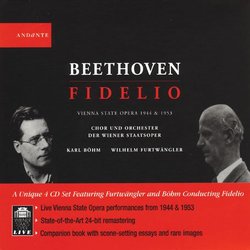| All Artists: Alfred Poell, Paul Schöffler, Tomislav Neralic, Ludwig van Beethoven, Karl Böhm, Wilhelm Furtwängler, Wiener Staatsopernorchester, Hilde Konetzni, Irmgard Seefried, Martha Mödl, Sena Jurinac, Peter Klein, Rudolf Schock, Torsten Ralf, Wolfgang Windgassen Title: Beethoven: Fidelio Members Wishing: 0 Total Copies: 0 Label: Andante Release Date: 2/22/2005 Album Type: Box set Genre: Classical Styles: Opera & Classical Vocal, Historical Periods, Classical (c.1770-1830), Modern, 20th, & 21st Century Number of Discs: 4 SwapaCD Credits: 4 UPC: 699487309029 |
Search - Alfred Poell, Paul Schöffler, Tomislav Neralic :: Beethoven: Fidelio
CD Details |
CD ReviewsTwo 'Fidelios': 5 Stars - Performances; 4 Stars - Sound J Scott Morrison | Middlebury VT, USA | 02/26/2005 (5 out of 5 stars) "The Andante label has been making some strange but interesting releases lately. Earlier they released, in the same box, two complete live performances from Austrian radio of Verdi's 'Falstaff' (Toscanini, 1937; Karajan, 1957, both from the Salzburg Festival); I didn't like them for a number of reasons--you can read my review here at Amazon. And this one is two complete performances of Beethoven's 'Fidelio,' also from Austrian radio and both from the Vienna State Opera. I won't keep you in suspense: I think both of them -- Böhm 1944; Furtwängler 1953 -- are sensationally good. Neither, as it happens, was actually recorded in the Vienna State Opera House. In 1944, towards the end of the War, performances had been strictly curtailed at the Opera House so this performance was recorded, and not all at the same time, in the Vienna Konzerthaus. Later in the War (March 1945) the Opera House was bombed and nearly destroyed, so the 1953 performance was a live performance at the Theater an der Wien where 'Fidelio' had been premièred in 1802.
As of this review Amazon has not listed the superb casts, so I will do so here: Böhm: Don Fernando - Tomislav Nevalic Pizarro - Paul Schöffler Florestan - Torsten Ralf Leonore - Hilde Konetzni Rocco - Herbert Alsen Marzelline - Irmgard Seefried Jaquino - Peter Klein First Prisoner - Hermann Gallos Second Prisoner - Hans Schweiger Furtwängler: Don Fernando - Alfred Poell Pizarro - Otto Edelmann Florestan - Wolfgang Windgassen Leonore - Martha Mödl Rocco - Gottlob Frick Marzelline - Sena Jurinac Jaquino - Rudolf Schock First Prisoner - Alwin Hendriks Second Prisoner - Franz Bierbach Some of these singers are not terribly well-known now, but there is not a weak singer among them. Particularly marvelous are the characterizations and singing of, for Böhm, Ralf (heroic, stupendous), Schöffler, Konetzni, the delicious young Seefried, and Herbert Alsen; for Furtwängler, Poell, Edelmann, Windgassen, Mödl (years before her later notorious wobble developed), Frick (was there ever a better Rocco?), Jurinac and Schock. The latter was luxury casting; he usually was singing leading roles then and later. And, of course, Jurinac was special as Marzelline. Together they made a couple who didn't seem the usual naïve young lovers, but rather they sounded like adults. Furtwängler made that much more possible because of the way he conducted the first half of Act I. Tempi were a bit slower there, and dynamics were softer, more considered than is usual. And when he came to the Quartet ('Mir ist so wunderbar') through to the trio of Rocco, Marzelline and Leonore, he slows down even further (a full minute longer for that section than Böhm) and an angelic radiance envelops the ensemble. (This, by the way, is Furtwängler's only complete opera recording with the Vienna State Opera forces.) Böhm's approach is more no-nonsense than Furtwängler's, although his handling of the final moments, from 'O namenlose Freude' to the end, is actually both more exciting and more emotionally touching, at least for me. As to performances of the score's 'big' numbers, there is little to choose from. I liked both performances of Leonore's 'Komm, Hoffnung' and Florestan's 'In des Lebens Frühlingstagen.' The chorus seems slightly stronger in the earlier performance. The orchestra in both instances is, well, the Vienna Philharmonic; what can I say? Fabulous. The horns in Leonore's aria are sensational. Both performances include the 'Leonore No. 3' Overture before the final scene. What about the sound? Well, considering the dates of these recordings, the sound in both performances is much more than acceptable. I was completely unaware, after the first few moments, of any dating of the sound. I will admit, of course, that my attention was much more on the performances and the music itself than on the sound. Obviously, neither of these performances would be a first choice for a recording for someone coming to the opera for the first time. It think most people still agree that the best studio recording ever made was the one conducted by Klemperer in stereo in 1962 (with Jon Vickers and Christa Ludwig) and there have been more modern recordings (in more modern sound) by Böhm (his last 'Fidelio' recorded in 1978, with James King and Hildegarde Behrens) and Maazel (1964, James McCracken, Birgit Nilsson). This set is a bit pricey. But this is also the only way to get these performances as they'd never been released before.* They are good enough to join the pantheon of great recordings of Beethoven's opera. I for one am not going to part with this set easily. I've been wallowing in it for the past few days and don't seem to be able to move on to anything else. *Since this review was posted it has been brought to my attention that the 1944 Böhm recording has been available before on at least two other labels. Scott Morrison" |

